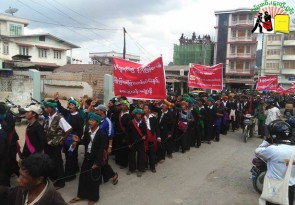Following a march in Taunggyi City, Shan State on 8 January by farmers protesting the seizure of their land by the Paoh National Organization (PNO) and the Paoh National Army (PNA) ethnic armed groups S.H.A.N. spoke to Colonel Khun Lar of the PNA.
Colonel Khun Lar, one of the most senior PNA leaders, his position in the PNA is command coordinator. The following is a trancript of a face-to-face interview with Yein Tai, a journalist from S.H.A.N..

Q: What do you think of the Paoh farmers who are protesting that the PNO and the PNA grabbed their land?
A: The PNO took some lands after we signed a ceasefire agreement with the government in 1991. These lands were taken between 1991 and 2010 for development projects to help the villagers. When we took these lands they had no crops growing on them and they were not being farmed and at the time the land had little value. We had careful discussions with the villagers and landowners before we took the land.
Q: What will the PNO do about these protests and claims?
A: The PNO and the PNA took these lands for our people and for local development. These land ownership problems have been going on for a long, long time. If their claims are true and they have evidence we will gradually solve them.
Q: Will your organisation solve all the claims?
A: Previously this was wild land and we spent millions of kyats to clear it [of trees and rocks] and then we created land lots. Now they are protesting and claiming they own the lots. How can we solve this? It is very difficult. Some of the lands [they are protesting about] are nothing to do with us, the administrative authorities also own some of the land, what are we supposed to do about these lands?
Q: Villagers say the PNA forbid them from joining the protests when they tried to join them and the PNA threatened them with guns when they complained about the land grabs. What would you like to say about this?
A: If the PNA had forbidden them [from complaining] the news would not even have reached you. Because we did not forbid them they could arrive here to protest. I have heard nothing about the PNA forbidding [people from protesting], checking on and threatening villagers. Let me know when and where this has happened if it has happened. We will check our forces and teach them a lesson if it is true.
Q: How many acres of land have been confiscated? Farmers are saying it could be up to 10,000 acres.
A: No. It cannot be 10,000 acres. Some lands, those we cannot grow on, were returned to the military government [before 2010] this was a lot [of the land]. We are holding no more than 300 to 400 acres.
Q: What do you think about the Paoh farmers who say the PNO and the PNA do not represent the Paoh people?
A: I assume that it is a big political party attacking our political party before the 2015 elections, Today, is it only the PNO and the PNA grabbing land in Shan State? Land dispute problems have involved all departments. The Tatmadaw [Burma Army] and government departments have also grabbed a lot of land. Why is it just the PNO and the PNA who are accused of land grabbing? I assume that it is an attempt to damage the reputation of the PNO so that it does not win the forthcoming 2015 election. It is also an attempt to break our unity. I think it is big political parties that benefit from land dispute cases.
Q: What party would that be? Why do you assume they are doing it to gain political benefit?
A: We cannot exactly say yet which party it is. We will talk with our party leaders and village heads about who are really leading the people. We know that the leaders of the protest are the Taunggyi district chairman of the National League for Democracy (NLD) and people from 88-generation group. They are not Paoh people, Let us solve Paoh people’s problems ourselves. We cannot accept other people inciting us [to protest].
The PNA signed a peace agreement with the government in 1991 and was transformed into a people’s militia group under the command of the Burma Army commander in chief. The PNO was established as a Paoh national party in 2011.
Translated by Aung Myat Soe English version written by Mark Inkey for BNI


